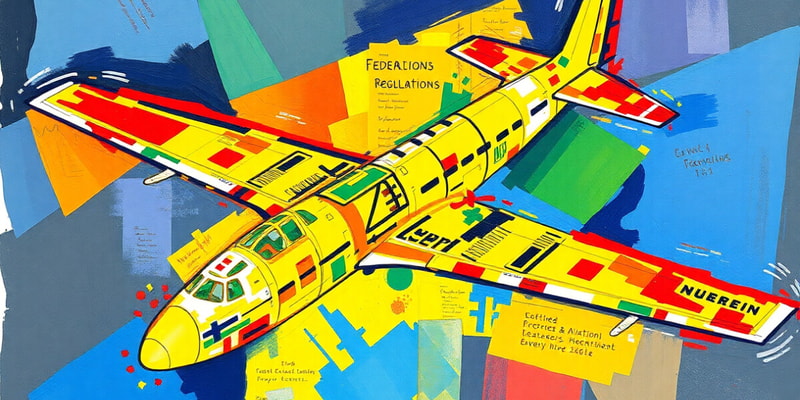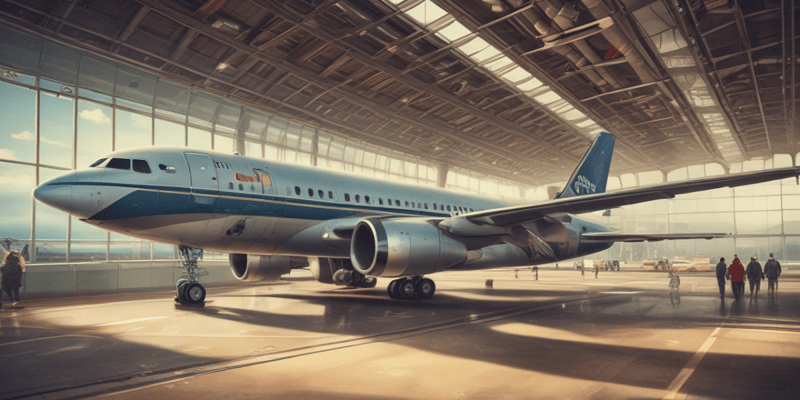Podcast
Questions and Answers
Which category does NOT classify fixed-wing aircraft according to FAR 23?
Which category does NOT classify fixed-wing aircraft according to FAR 23?
Federal Aviation Regulations are managed by the Aviation Safety Agency in the US.
Federal Aviation Regulations are managed by the Aviation Safety Agency in the US.
False
What is the primary purpose of the Federal Aviation Regulations?
What is the primary purpose of the Federal Aviation Regulations?
To control all aspects of aviation in the US.
The _____ structure configuration includes components such as the fuselage, wings, and tail.
The _____ structure configuration includes components such as the fuselage, wings, and tail.
Signup and view all the answers
Match the following aircraft categories with their corresponding regulations:
Match the following aircraft categories with their corresponding regulations:
Signup and view all the answers
What is a factor that influences aircraft configuration?
What is a factor that influences aircraft configuration?
Signup and view all the answers
All fixed-wing aircraft fall under FAR 23 regulations.
All fixed-wing aircraft fall under FAR 23 regulations.
Signup and view all the answers
Name one of the two categories for rotorcraft according to aviation regulations.
Name one of the two categories for rotorcraft according to aviation regulations.
Signup and view all the answers
Passenger aircraft internal layout is a part of the aircraft _____ configuration.
Passenger aircraft internal layout is a part of the aircraft _____ configuration.
Signup and view all the answers
What is largely controlled by the FAA in relation to aviation?
What is largely controlled by the FAA in relation to aviation?
Signup and view all the answers
What is the main purpose of landing gear on an aircraft?
What is the main purpose of landing gear on an aircraft?
Signup and view all the answers
All aircraft can have fixed landing gear configurations.
All aircraft can have fixed landing gear configurations.
Signup and view all the answers
What are the two types of landing gear mentioned?
What are the two types of landing gear mentioned?
Signup and view all the answers
What is the primary function of the nose wheel in an aircraft?
What is the primary function of the nose wheel in an aircraft?
Signup and view all the answers
In the ______ category, fixed-wing aircraft have less than 8600kg MTOW.
In the ______ category, fixed-wing aircraft have less than 8600kg MTOW.
Signup and view all the answers
The number of main landing gear on an aircraft is independent of its maximum landing weight (MLW).
The number of main landing gear on an aircraft is independent of its maximum landing weight (MLW).
Signup and view all the answers
Match the following landing gear configurations with their descriptions:
Match the following landing gear configurations with their descriptions:
Signup and view all the answers
Name one layout feature of the Airbus A380.
Name one layout feature of the Airbus A380.
Signup and view all the answers
Which category includes aircraft that do not fall under the normal category?
Which category includes aircraft that do not fall under the normal category?
Signup and view all the answers
The BA 747 passenger aircraft configuration V1 includes Open Suite First in rows ______ to ______.
The BA 747 passenger aircraft configuration V1 includes Open Suite First in rows ______ to ______.
Signup and view all the answers
Retractable landing gear is a standard feature in all transport category aircraft.
Retractable landing gear is a standard feature in all transport category aircraft.
Signup and view all the answers
Which of the following modifications can be made to freighter aircraft?
Which of the following modifications can be made to freighter aircraft?
Signup and view all the answers
What configuration does a T-tail fall under?
What configuration does a T-tail fall under?
Signup and view all the answers
Match the following Boeing 747-400 configurations with their respective features:
Match the following Boeing 747-400 configurations with their respective features:
Signup and view all the answers
The ______ section includes configurations like cruciform and butterfly.
The ______ section includes configurations like cruciform and butterfly.
Signup and view all the answers
What is a disadvantage of fixed landing gear?
What is a disadvantage of fixed landing gear?
Signup and view all the answers
The Boeing 787-8 has an entirely different layout than the Boeing 747-400.
The Boeing 787-8 has an entirely different layout than the Boeing 747-400.
Signup and view all the answers
What is one type of aircraft that can undergo a passenger to freighter conversion?
What is one type of aircraft that can undergo a passenger to freighter conversion?
Signup and view all the answers
The ______ aircraft has three different passenger configurations, namely V1, V2, and V3.
The ______ aircraft has three different passenger configurations, namely V1, V2, and V3.
Signup and view all the answers
Study Notes
ME2511 Aircraft Structures
- Course covers aircraft configuration and internal layout
- Learning objectives include understanding general aircraft configurations, construction, categories and layout for different types of aircraft (business, freighter, passenger)
Aircraft Configuration
- Fuselage configuration: Describes the shape and structure of the fuselage
- Wing configuration: Describes the shape, placement, and structure of the wings
- Tail configuration: Describes the shape, placement, and structure of the tail assembly
- Landing gear configuration: Describes the gear arrangement and function of the landing gear
- Understanding general aircraft configurations, construction, categories and layout is crucial to designing and understanding aircraft
General Fixed-Wing Aircraft Configuration
- Diagrams show various aircraft components (e.g., wing upper surface, vertical stabilizer, rudder, APU exhaust, APU inlet, trailing-edge flaps, ailerons, wing tip, static ports, pitot tubes, engine intake)
- Key components and their functions are highlighted
General Aircraft Categories
- Types of aircraft: includes freighter, military, private, passenger, business, and government aircraft
- Categorization: based on customer needs and determined by the particular aircraft configuration
Aircraft Categories
- Federal Aviation Regulations (FAR) are mandates that govern all aspects of aviation in the US
-
FAR categories of aircraft
- Normal, Utility, Acrobatic and Commuter Category Fixed-Wing Aircraft (FAR 23)
- Transport Category Fixed-Wing Aircraft (FAR 25)
- Normal Category Rotorcraft (FAR 27)
- Transport Category Rotorcraft (FAR 29)
- Manned Free Balloons (FAR 31)
Aircraft Categories (Maximum Take-Off Weight)
- MTOW: Maximum Take-Off Weight
- Normal, Utility, Acrobatic and Commuter Category fixed-wing aircraft (FAR 23) have a maximum weight less than 8600 kg and fewer than 19 passenger seats
- Transport category fixed-wing aircraft (FAR 25) encompasses aircraft not classified under the normal category
Transport Category Aircraft
- Explains the differences between narrow and wide-body aircraft configurations
- Details diagrams illustrating plan and cross-sectional views of aircraft interiors
- Shows the positions of lavatories, galleys, passenger seats, and cargo pallets, highlighting differences in seating arrangements
Unique Fuselage Shapes
- Images of different aircraft featuring unique fuselage designs (e.g., Aero Spacelines Super Guppy, Boeing 747 Dreamlifter, Airbus A380, Short Skyvan)
Unique Wing Planform
- Illustrations and examples of different wing planform configurations
- Sweepback wing planform
- Delta Wing Planform
- Elliptical wing planform
- Forward sweep wing planform
Wing Configuration
- Displays different wing configurations, including low wing, mid wing, high wing, inverted gull wing, gull wing, dihedral wing, and anhedral wing
Wing Planform Configuration
- Presents various wing planform configurations based on aspect ratio:
- Low aspect ratio, moderate aspect ratio, and high aspect ratio
- Different types of swept, tapered, reverse tapered, compound tapered wings, and others
Wing Planform Configuration 2
- Illustrates various delta wing configurations (e.g., tailless delta, tailed delta, cropped delta, compound delta, ogival delta, crescent, cranked arrow, M-wing, and W-wing)
Empennage Section Configuration
- Diagrams showcasing different empennage configurations (e.g., fuselage-mounted, cruciform, T-tail, flying tailplane, tailplane-mounted, twin tail boom, wing mounted, V-tail, inverted V-tail, X-tail, Pelican tail, ventral fin, and triple fins)
Common Empennage Section Configuration
- Details standard tail, twin tail, T-tail, and V-butterfly tail configurations with labels for components like rudder, elevators, and fins
Empennage Configuration
- Shows different aircraft featuring various empennage layouts
- Fuselage mounted, T-tail, cruciform, butterfly or V-tail, and twin-tail
Unconventional Aircraft Configuration
- Illustrations of unconventional aircraft configurations such as flying wing (B2 Stealth Bomber), Bumble Bee, blended-wing aircraft, and Proteus tandem-wing high-altitude aircraft
Landing Gear
- Supports the aircraft during ground operations
- Two main types: fixed and retractable
- Fixed landing gear simple but produces drag during flight. Commonly used for low-speed aircraft.
- Retractable landing gear more streamlined reduces drag to increase performance, complex and commonly found in higher speed aircraft
- Landing gear must be strong and lightweight to withstand landing forces and prevent aircraft from tipping over
Landing Gear Configuration
- Shows conventional landing gear configuration (primarily from pre-WWII aircraft).
- Details tail-wheel steering and possibility of the nose or tail being lifted during hard braking of low-speed aircraft.
- Displays fixed-landing-gear configuration commonly used for low-speed aircraft
- Shows the configurations commonly used for aircraft with nose wheel steering and take-off and landing without risk of aircraft tipping
Landing Gear Configuration 2
- This configuration features retractable landing gear in standard category transport aircraft, business jets, and military aircraft
- This features reduced drag and improved performance compared to previous landing gear configurations
- Characteristics include nose wheel steering, aircraft level during takeoff, and the number of main landing gears depending on the aircraft's weight
Aircraft Engine Configurations
- Describes various engine placements on aircraft. Includes engines placed in front, under, and through the wings, and at rear fuselage
Aircraft Door / Air Stairs (ATR 42 Regional Airliner)
- Explains the design and components of the door/air stairs, showing components like forward latch bolts, rear fixed-step latch bolts, and damper assembly
Passenger Aircraft (Airbus A380) Layout
- Illustrates the interior layout of an Airbus A380, showing various sections like business class, first class, galleys, toilets, passenger areas, cargo hatch, and duty-free shop.
Passenger Aircraft (Boeing 787-8) Layout
- Presents a diagram showing the interior layout of a Boeing 787-8
Passenger aircraft interior layout
- Explains the interior layout of an Airbus A340-600
BA has 3 747 Passenger aircraft configuration
- Illustrates Boeing 747 configurations, including open suite first, standard world traveler plus, flat bed club world, and standard world traveler
BA 747 Passenger aircraft configurations
- Presents different configurations (e.g., V1, V2, V3), defining open suite first, standard world traveler plus, flat bed club world, and standard world traveler
Business jet interior layout
- Depicts the interior of a Falcon 7X business jet, highlighting features relevant to its design
Passenger to Freighter Conversion
- Discusses modifications needed to transform passenger aircraft into freighters
- Details a YouTube video demonstrating the transformation process
Freighter aircraft interior layout
- Presents the interior layout of a Boeing 767-300 freighter
Freighter a/c internal structure
- Describes an example of an internal structure of a freighter
End
Studying That Suits You
Use AI to generate personalized quizzes and flashcards to suit your learning preferences.
Related Documents
Description
This quiz explores the Federal Aviation Regulations (FAR 23) and the classification of fixed-wing and rotorcraft aircraft. Test your knowledge on aircraft components, landing gear configurations, and the primary purposes of various aviation regulations. Ideal for students and aviation enthusiasts!




